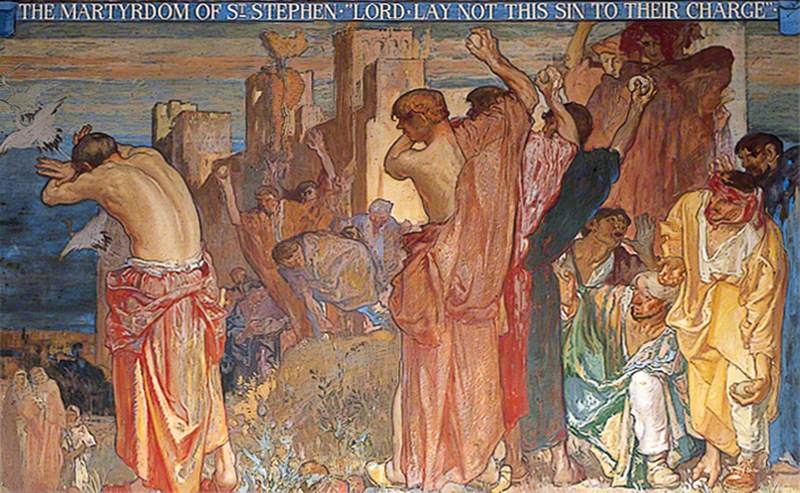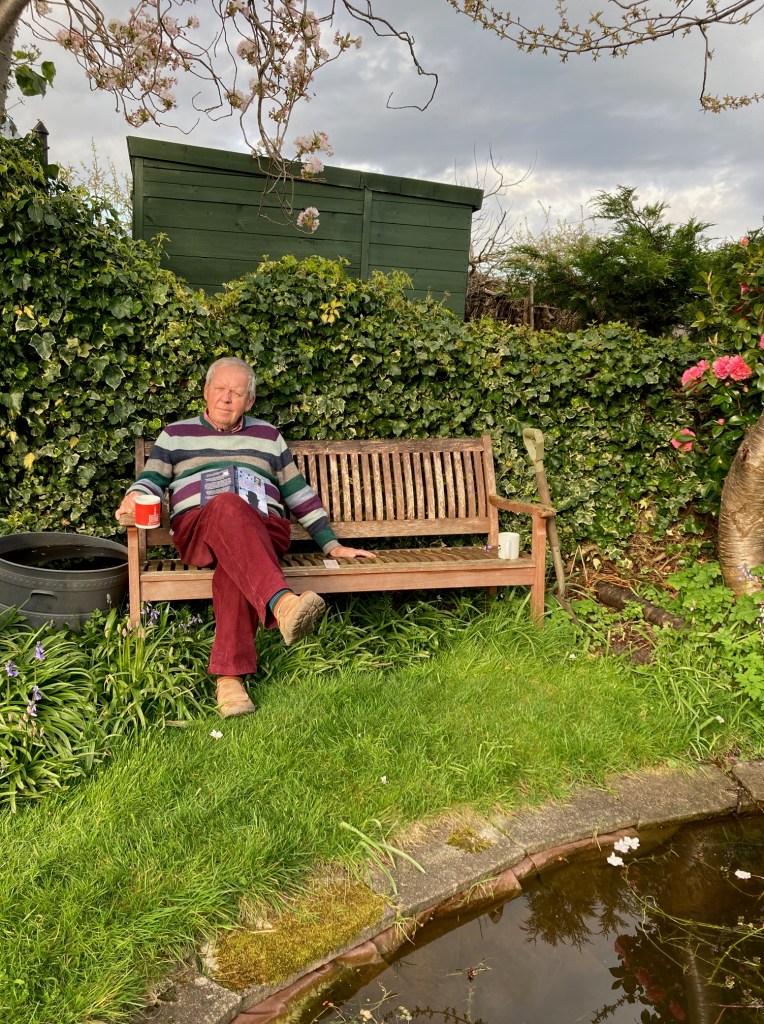Back to school again
With hindsight I may have over-invested in the 60 Years On reunion down at CH. It was a long way down and back on the train, and involved two nights in a modest but friendly hotel in Horsham. For what was in truth a modest event: mid-morning gathering for coffee; a visit to a boarding house, Coleridge A to be precise; a visit to the CH museum, housed on the top floor of what used to be ‘the sicker’; Dinner Parade in the sunshine, visually impressive and the most nostalgic moment of the day; and a lunch that was incomparably better than the food I remember. And the [short] day was finished with a service in the CH chapel, dominated by the Brangwyn cartoons. And led by a young, ex-military chaplain wearing [what I thought was] a frilly cotta.

Nervous about finding no-one I knew, I had been in touch with four friends beforehand that I was looking forward to meeting up with. Walter was a ‘no show’, prevented from coming up from Chichester by a medical emergency of his sister. And Pete, whom we see from time to time here in Edinburgh, was a bit overcome – I’m not sure why, and disappeared after an hour. But I was pleased to talk to John, who had driven down from near Malvern. And to have a long talk with Mick, whom I last saw in 1967. Both Pete and Mick were fellow History Grecians, but both opted out of the Oxford route, possibly seduced by the more obvious attractions of London in the early 1960s. Sex and drugs and rock and roll. Loosely speaking.
Going down on the train I re-read Bryan Magee’s Growing Up in a Time of War. Magee was an LCC scholarship boy from Hoxton, who was at CH in the 1940s before going on to a career as an academic philosopher and writer and broadcaster. The book records Magee’s appreciation of ‘Daddy’ Roberts and others. But it also highlights the sadistic tendency of other masters, who clearly derived sexual pleasure from administering beatings. I think by the time I was at CH, a decade later, he was probably on the black list, definitely persona non grata.

Magee incidentally spent a few weeks as a Grecian on an exchange programme with the Lycée Hôche in Versailles. School exchanges are out of fashion these days and notoriously difficult to arrange. But, following a chance conversation down at CH, I’ve just written to the senior Modern Language teacher, asking if they would be interested in developing a link with the Institut les Chartreux in Lyon. If so, I’d be pleased to put them in touch with Jean-Bernard Plessy.On the way back I thought a bit about my time at CH. In the 1950s-60s it was certainly an elitist school; geared towards preparing candidates for Oxbridge, and with a strong bias towards Classics, Mathematics, and History. I certainly learnt a lot of Greek verbs and medieval history. Without CH I wouldn’t have gone on to Balliol. And the school inculcated a distinct set of values [or prejudices]; intellectual curiosity, a willingness to question authority, a concern for books, a set of broadly left-wing attitudes. In favour of economic redistribution and of closer ties with Europe. But, curiously, in spite of, or possibly because of, a dose of daily chapel services, the school did nothing whatever to help me develop a spiritual life. And that was before chaplains with cottas ! Walter, who was the ‘no show’ last week is the only school friend who got ordained; serving in the west edge of the Hereford Diocese, in Kilvert country, and then in Huntingdon, before becoming Canon Residentiary and Vice Dean at Chelmsford.

The trivial round
We have been back from Grenoble for just over three weeks. It seems longer. When we got home the house was cold and the boiler had stopped working. Which is mercifully now fixed. And there have been a number of overdue appointments. A meeting with the diabetic nurse. Which usually means advice to shed a few kilos. An appointment with the dentist. I’ve been going to the same dentist in Musselburgh since 1988. But he has now retired, and the practice is no longer going to accept National Health Service patients. So that looks like another monthly standing order.
And two appointments with the optician. I already knew that I have an incipient cataract in my left eye. [The right eye was done twenty-plus years ago.] I’ve been on the waiting list for about 17 months now, so I’m not holding my breath. This week there is also the possibility of incipient glaucoma. So I’m going on another waiting list to get a second opinion at the Eye Pavilion. As I said to my very nice Chinese optician from Kuala Lumpur, I may not live that long.

Looking ahead
Susie has been known to complain that this blog spends too much time looking backwards. So – let me say that we have decided to downsize into a [retirement] apartment in five years time. Which means that she is already staying awake at night worrying about how to dispose of all our junk. It isn’t all junk, of course. But we do have more than thirty soft animals. For when the grand-children come to stay, not for us. And I have an awful lot of socks. And probably enough books to last me for another twenty years.

I’m currently reading The Man who was Smiley, a biography of John Bingham, the 7th Earl of Clanmorris, a journalist and author, who was also an agent-runner for MI5.He wasn’t a very exciting man; slightly podgy, with very thick glasses, who was instantly lost in a crowd. He wrote crime fiction and espionage novels, and although his early books attracted good reviews they didn’t sell very well. But he was a onetime colleague of John le Carré in MI5 and seemingly the model for George Smiley. Like Smiley he was a skilled interrogator, and he seems to have been the product of an old-fashioned and more sedate world. Apparently he cleaned his glasses with the fat end of his tie. Something that Alec Guinness did in the [superb] television productions of Tinker, Tailor, Soldier, Spy and of Smiley’s People. It seems that Bingham’s wife was violently jealous of le Carre because of his success as a writer. But Bingham seems to have been unperturbed by it.
And I’m nervously eyeing up Touching Cloth by Fergus Butler-Gallie. Nervously because his previous book, A Field Guide to the English Clergy, was extraordinarily bad; arch, unoriginal, and unfunny. I’ve been given this new one. And I want to believe that it might be better.

Meanwhile there are jobs to be done in the garden. And circuits of Arthur’s Seat. And a decision to be made about private dentistry. After which we are going back to Normandy for a week with the children and grand-children. Back to Barneville-Carteret. Followed in June by what might be our last road trip up north; to Arisaig, across to Skye, on to Harris and Lewis, and back from Stornaway to Ullapool. The friendly garage in Dalkeith have decided, suitably apologetically, that this might be the last year that they will let us hire a car.
More about all of this in due course.
April 2024
don’t get too excited about ‘Touching Cloth’… I have read it.. and was not so impressed except for a couple of nice parts of encounter the rest not really worth it…
LikeLike
Heather It was a gift from Richard Simpson. So, I’m keeping my fingers crossed !Are you fully well these days ?
LikeLike